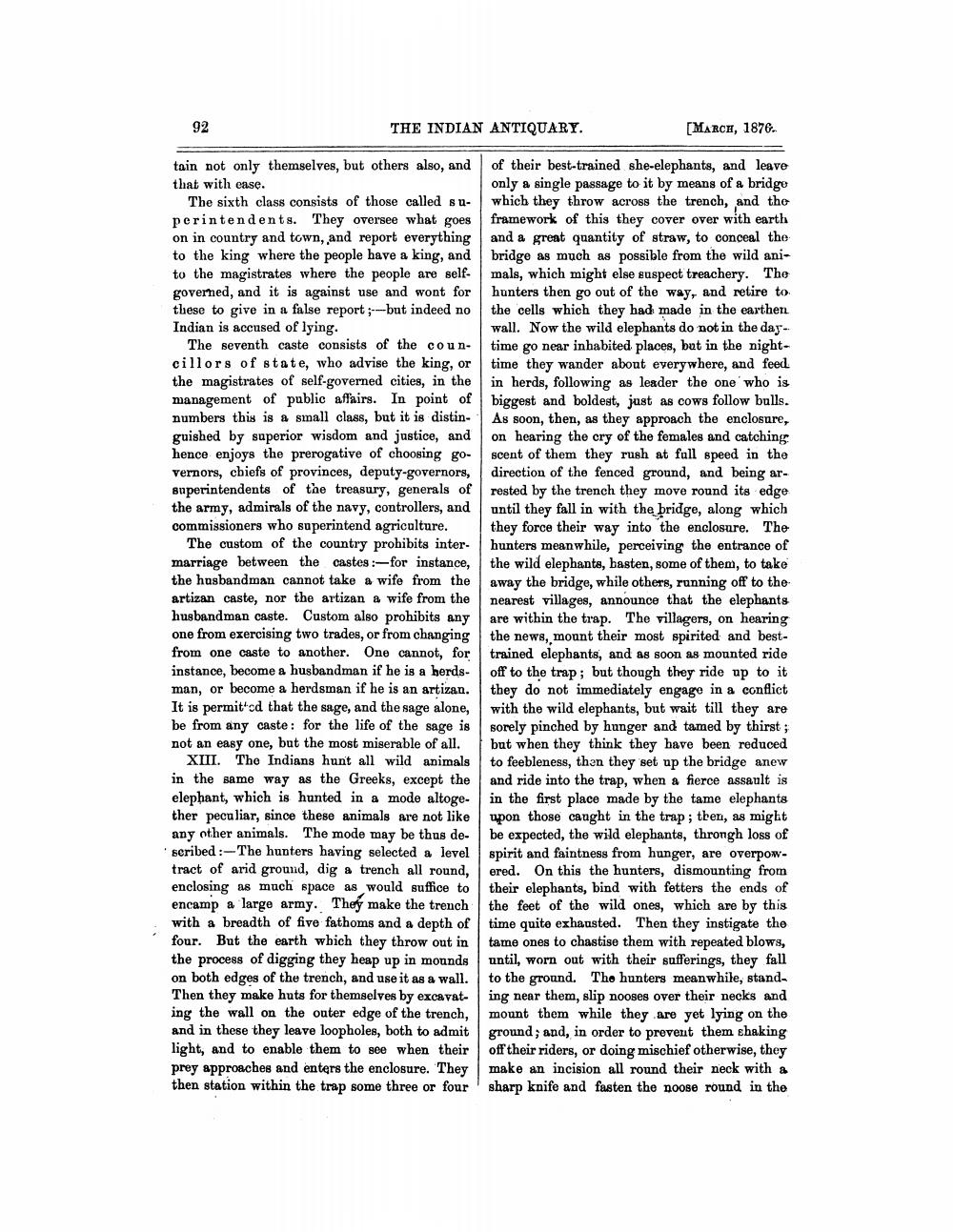________________
92
THE INDIAN ANTIQUARY.
tain not only themselves, but others also, and that with ease.
The sixth class consists of those called superintendents. They oversee what goes on in country and town, and report everything to the king where the people have a king, and to the magistrates where the people are selfgoverned, and it is against use and wont for these to give in a false report;---but indeed no Indian is accused of lying.
The seventh caste consists of the councillors of state, who advise the king, or the magistrates of self-governed cities, in the management of public affairs. In point of numbers this is a small class, but it is distinguished by superior wisdom and justice, and hence enjoys the prerogative of choosing governors, chiefs of provinces, deputy-governors, superintendents of the treasury, generals of the army, admirals of the navy, controllers, and commissioners who superintend agriculture.
The custom of the country prohibits intermarriage between the castes:-for instance, the husbandman cannot take a wife from the artizan caste, nor the artizan a wife from the husbandman caste. Custom also prohibits any one from exercising two trades, or from changing from one caste to another. One cannot, for instance, become a husbandman if he is a herdsman, or become a herdsman if he is an artizan. It is permitted that the sage, and the sage alone, be from any caste: for the life of the sage is not an easy one, but the most miserable of all.
XIII. The Indians hunt all wild animals in the same way as the Greeks, except the elephant, which is hunted in a mode altogether peculiar, since these animals are not like any other animals. The mode may be thus described:-The hunters having selected a level tract of arid ground, dig a trench all round, enclosing as much space as would suffice to encamp a large army. They make the trench with a breadth of five fathoms and a depth of four. But the earth which they throw out in the process of digging they heap up in mounds on both edges of the trench, and use it as a wall. Then they make huts for themselves by excavating the wall on the outer edge of the trench, and in these they leave loopholes, both to admit light, and to enable them to see when their prey approaches and enters the enclosure. They then station within the trap some three or four
[MARCH, 1876.
of their best-trained she-elephants, and leave only a single passage to it by means of a bridge which they throw across the trench, and the framework of this they cover over with earth and a great quantity of straw, to conceal the bridge as much as possible from the wild animals, which might else suspect treachery. The hunters then go out of the way, and retire to the cells which they had made in the earthen wall. Now the wild elephants do not in the daytime go near inhabited places, but in the nighttime they wander about everywhere, and feed in herds, following as leader the one who is biggest and boldest, just as cows follow bulls. As soon, then, as they approach the enclosure, on hearing the cry of the females and catching scent of them they rush at full speed in the direction of the fenced ground, and being arrested by the trench they move round its edge until they fall in with the bridge, along which they force their way into the enclosure. The hunters meanwhile, perceiving the entrance of the wild elephants, basten, some of them, to take away the bridge, while others, running off to the nearest villages, announce that the elephants are within the trap. The villagers, on hearing the news,, mount their most spirited and besttrained elephants, and as soon as mounted ride off to the trap; but though they ride up to it they do not immediately engage in a conflict with the wild elephants, but wait till they are sorely pinched by hunger and tamed by thirst; but when they think they have been reduced to feebleness, then they set up the bridge anew and ride into the trap, when a fierce assault is in the first place made by the tame elephants upon those caught in the trap; then, as might be expected, the wild elephants, throngh loss of spirit and faintness from hunger, are overpowered. On this the hunters, dismounting from their elephants, bind with fetters the ends of the feet of the wild ones, which are by this time quite exhausted. Then they instigate the tame ones to chastise them with repeated blows, until, worn out with their sufferings, they fall to the ground. The hunters meanwhile, standing near them, slip nooses over their necks and mount them while they are yet lying on the ground; and, in order to prevent them shaking off their riders, or doing mischief otherwise, they make an incision all round their neck with a sharp knife and fasten the noose round in the




